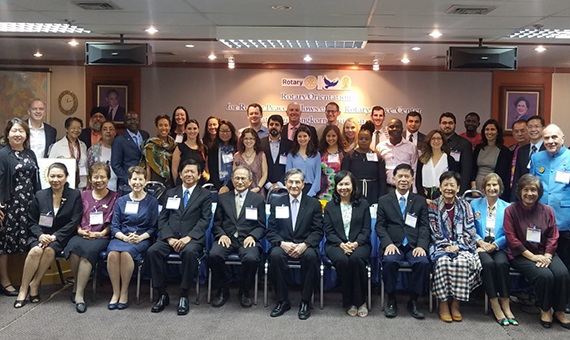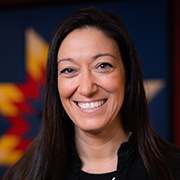
Orientation for Rotary Peace Fellows at Chulalongkorn University in Bangkok, Thailand.
 By Bonnie Emerson, Rotary Peace Fellow at Chulalongkorn University, Bangkok, Thailand, Class 26, from Canada
By Bonnie Emerson, Rotary Peace Fellow at Chulalongkorn University, Bangkok, Thailand, Class 26, from Canada
As an Indigenous (Metis) Canadian woman from Winnipeg Manitoba, I was surprised and very honoured when I was encouraged to apply for the Rotary International Peace Fellowship Program. I wasn’t too optimistic, though. How could a police officer from a mid-sized Canadian city be selected when applicants come from all over the world?
Still, I decided to give it my best shot and organized my information (applications, essays, approvals, and interview preparations). When I received notification that I had been accepted, my heart stopped. I was dumbfounded and thrilled. I was being given an opportunity to sit in a class with global experts in peace work and to learn and share our work with each other. What an unbelievably rare and potentially transformational opportunity.
Applying for the fellowship, and then actually making preparations to attend if accepted, can be daunting. So I thought I would share some advice I learned for anyone considering applying. And I highly recommend that you do.
First, before you apply, connect with past Rotary Peace Fellows. Rotary was so supportive, connecting me with individuals who have participated in the program in the past who continually encouraged me along the way.
Second, when you apply, write down clearly what you do, and what you have done. Do not be shy about including any volunteer work, the projects and the experiences. They are all important (lived experience especially). As a police officer, I oversee our Community Support Division which includes officers working in the areas of crime prevention, youth, Cadets, school officers, victim services, diversity, and Indigenous partnerships. However, my connection to and work with community boards and NGO’s were as valuable.
Third, be optimist, and plan ahead for what you will do if accepted. Seven weeks is a mad rush to: attend the travel clinic for shots; select a conflict project that you are currently involved in and will work on throughout the course; make arrangements to leave, find coverage at work and on any volunteer boards you serve; apply for and receive a required Education Visa; research Thailand’s customs and cultures (please spend some time on this it will make your transition here much smoother); and book your flights.
I have been in Thailand for two weeks now as a member of Class 26 which includes 22 Peace Fellows from 14 countries. My classmate’s work and background are diverse and absolutely fascinating. There are already different opinions, understanding, and perspectives. We have engaged each other inside and outside of class about our work and our knowledge. The absolute best part is that we do not all agree. But we listen and we learn and our own understanding and perspectives may have shifted as a result. Almost each person in class has stated their desire to learn from and with each other.
I have renewed optimism that with open minds and hearts we can contribute to small and large differences in this world of ours towards positive peace. I am looking forward to the coming weeks and almost as much returning home to share this experience and help support changes in my community. Thank you Rotary for making this possible!
Adapted with permission from RotaryPeaceChula. Follow more by Bonnie on peace at https://bemersonpeace.ca/
https://blog.rotary.org/2019/02/27/how-to-prepare-to-be-a-rotary-peace-fellow/
